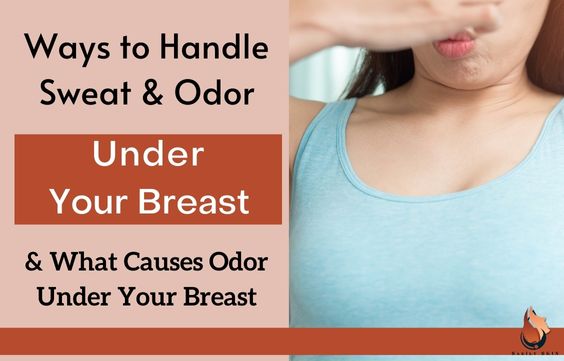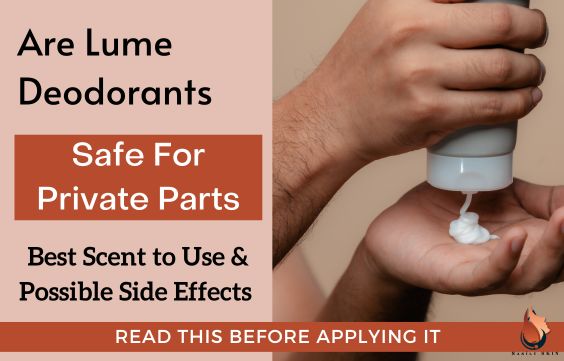Deodorants for Female Private Parts- What You Need to Know

Something that has become very popular lately is the use of deodorants for female private parts. But, the real questions are:
- Do you really need them?
- Are they safe?
- Do they have side effects and risks associated with them?
- Would your OB/GYN recommend them?
- Are there any good brands that you can use
However, one thing all doctors will tell you is that vaginas are supposed to smell like vaginas. They should not be expected to normally smell like fruits and flowers. But, thanks to mainstream media, that is just another thing we ladies have been made to feel weird about.
So, let’s discuss this “female phenomenon” and see what we can learn.
First, we need to talk about what causes odor down there in the first place and how to differentiate between what is normal and what is not.
What Causes Vaginal Odor
Just like in the underarms, the vaginal area and the skin around it contains sweat glands and many microorganisms that are responsible for keeping the area healthy. When the microorganisms react with sweat, dead skin cells, and vaginal discharge, they can produce an odor.
Bodily fluids that can cause odor when they interact with bacteria on the skin include sweat, menstrual blood, and vaginal discharge.
Now keep in mind that vaginal discharge is normal. The smell and texture will usually change depending on your cycle and hormonal fluctuations. However, vaginal discharge is important to keep the vagina healthy, lubricated and clean.
Related Article – Best Deodorants & Antiperspirants For Under Your Breasts
Normal vs Abnormal Vaginal Odor
It is normal for the vagina and the groin area to have a different scent than the rest of your skin. It is usually not overpowering or offensive. If it is offensive and overpowering, then that is abnormal and indicates that something is wrong.
Normal vaginal odor is usually described as slightly musky and earthy. Normal vaginal secretions sometimes are odorless or have a slight egg-white smell. Neither of these should be too strong or offensive, especially if you shower regularly and practice good vaginal hygiene.
On the other hand, abnormal vaginal odor or discharges that smell bad are usually indicative of some underlying problem, most commonly, infections. Signs of an infection or reaction can be:
- A strong, foul, or fishy smell (bacterial vaginosis)
- A sudden change in odor
- Malodorous discharge with an unusual color or texture (yeast infection, trichomoniasis, STIs, etc)
- Discomfort, itching, or irritation in the genital area
If you experience any of these signs, then you need to see your OB/GYN immediately.
So, now, the question is, how do we keep our vaginas healthy? The answer is good hygiene.
What Is Good Vaginal Hygiene
Good vaginal hygiene aims to keep the surrounding skin clean and to maintain a balanced pH.
This is also the step in your daily routine where deodorants may come in handy. So let’s see.
- The vagina has a normally acidic pH (about 3.5-4.5). This keeps it healthy and keeps the resident microorganisms controlled. If the pH becomes too acidic or more alkaline, then the microorganisms will overgrow or die, which can cause infections and irritation.
So, to avoid this, doctors will recommend that you avoid harsh, highly scented or fancy products down there. In fact, most, if not all of them, will suggest that you only use water to wash your vagina. Water is neutral and is the safest bet when it comes to keeping your pH unaffected.
- Do not douche. Your vaginal canal cleans itself and you do not need to flush it out with anything, especially not cleansers or soap. You will dry it out and disrupt the pH which will only make your life more uncomfortable.
- Since many of us sweat in our folds and creases, it is normal for your groin to be a little sweaty. If you are showering and you want to wash that area, you can use water (or very mild soap) to wash the groin area, upper thighs, and the exterior skin of the labia majora. Do not get soap into the folds and creases of your vagina.
- Stick to unscented or lightly scented products. Scented products are very likely to cause irritation in that area and disrupt the pH of the skin there. If you feel like you need to use a scent, then stick to external skin only, use mild scents, and use as little product as possible.
Related Article – Best & Safest Deodorants For Your Bum (Men & Women)
So, How Do Deodorants Work For Female Private Parts
If you must use a deodorant down there, I recommend using aluminum-free and either solid or cream ones. They will help to absorb sweat and mask odor.
Even though it is normal for the skin down there to smell different, some people prefer to have no scent at all or to smell like flowers and fruits. And that is entirely fine, as long as you are not irritating the area down there and causing more harm than good.
You should not use products that will block your sweat glands down there. These are very likely to cause ingrown hairs, and folliculitis, which will be very uncomfortable and lead to irritation, itching, pain and possible infections.
This is why I recommend using aluminum-free deodorants. These will not block your sweat glands but will, instead, absorb the sweat that you produce to keep the area dry as long as possible.
This alone should be able to control odor. However, if you want to also mask any possible breakthrough odor, then you can use slightly scented deodorants.
Keep in mind that if your odor is being caused by an underlying problem, nothing you do will get rid of that odor unless the problem is treated.
Is “natural” better?
Not really.
While many companies will use the word “natural” to indicate that their products are healthier for down there, that is not always the case. Instead of jumping at the word “natural”, take a good look at the ingredients and look for the absence of aluminum and other ingredients that can irritate your skin.
How To Apply Deodorants For Female Private Parts
Generally, deodorants for private parts are designed to be used on the external skin only. This means they can be applied to:
- The outside of the labia major,
- the crease between your labia major and
- your upper thighs (groin),
- the skin of the upper and inner thighs,
- and the skin between your butt cheeks.
- Different brands of deodorants will come with different instructions on how much product you will need and how often you will need to use it, so follow those instructions.
- Also, do not put the deodorant on or near the vulva (the vaginal opening), inside your vagina or on the soft, mucosal skin (clitoris and labia minora). Do not put it in your anal opening or too close to the puckered skin there either (this can cause irritation and itching).
- Always apply from front to back. That is, start from your external vaginal first, then move to your groin and thigh, and do your butt last. This will avoid transferring bacteria from your skin to your vaginal area which can use infections.
Risks Of Using Deodorants For Female Private Parts
The major risks of using deodorants for female private parts are irritation, disrupted pH balance, and infections.
The ingredients used in deodorants may not agree with our skin and may cause irritation. This can lead to itching, rashes and bumps that can be uncomfortable and even become infected.
Certain ingredients, if they get into the vagina, can disrupt the delicate pH balance down there. This can cause the bacteria there to become too much or too little, which can also lead to infections.
Therefore, my recommendations are that you:
- Use natural deodorants
- Choose an unscented option or one that is mildly scented
- Check the ingredients list to make sure you are not allergic to any of the ingredients
- Always do a patch test to make sure your skin does not react badly to the product
- Practice good, regular vaginal hygiene
- Visit your OB/GYN as regularly as necessary to make sure everything is good down there, especially if you are not sure or are uncomfortable about the way you smell.
Related Article – Best Ball Deodorant & Sprays -Safe for Men’s Private Parts
Best Deodorants For Female Private Parts
I personally do not recommend using deodorant sprays for your private parts. It is much better to use a cream or stick deodorant so that you have exact control over how much you use and where the product ends up.
While I do not think that deodorants for your private parts are a necessity, if you must use them, here are a few that I think have merit:
1- Lume Deodorant Cream And Stick
Lume is a natural deodorant company whose products were designed by an OB/GYN to be used all over the body, including the private parts for both men and women.
What I like about Lume is that the products are easy to use and you only need very little of each. Depending on your odor, you also do not need to use them every day! They are also available in both scented and unscented options.
Amazon usually have Lume Deodorants in stocks you can check out the links below to get them :
Click here get the Lume Deodorant Cream
Click here to view and purchase the Lume Deodorant Stick.
I also go much in-depth on using Lume Products in these articles here:
Lume Deodorant for Private Parts- Is it Safe & Best Scents
Lume Deodorant Review- Is It Really Safe & Side Effects
2- Vagisil Deodorant Powder And Wipes
Vagisil is not your typical deodorant formulation. This brand is specially designed for the vaginal area and comes in washes, wipes, sprays and powders. I would recommend using the wipes and the powder.
I do not recommend using the spray or the washes since those can get into the vagina or on the mucosal skin. And, even though they say that it was designed to keep your pH balanced, I still would not take that chance.
The deodorant powder is talc-free and mildly scented, but it does contain baking soda (Sodium Bicarbonate), so ensure that you are not sensitive to this ingredient. Other ingredients include Zea Mays (Corn) Starch, Magnesium Stearate, Aloe Barbadensis Leaf Extract, Tocopheryl Acetate, Tricalcium Phosphate, Mineral Oil, Polyoxymethylene Urea, Maltodextrin, Fragrance
The wipes are said to be pH-balanced and hypoallergenic. However, they should still only be used externally. The ingredients used on the wipes include Water, Polysorbate 20, Hamamelis Virginiana (Witch Hazel) Water, Laureth-9, Alcohol, Phenoxyethanol, Melaleuca Alternifolia (Tea Tree) Leaf Oil, Anthemis Nobilis Flower Extract, Calendula Officinalis Flower Extract, Sodium Lactate, Disodium EDTA, Glycerin, Lactic Acid, Propylene Glycol, Menthol, Benzoic Acid, Dehydroacetic Acid, Fragrance.
Always do a patch test for either of these products.
You can Click here to get the Vagisil Odor Block Deodorant Powder on Amazon.
You can Click here to check out the Vagisil Odor Block Freshening Wipes on Amazon.
3- Super Fresh Lady Parts
This deodorant cream is impressive because it starts as a lotion which gives you more control, but then it dries down to a comfortable powder finish. The lotion-to-powder formula is expected to prevent odor, stop stickiness and chafing, and absorb mild moisture.
It is also talc-free with natural ingredients and perfect for breasts, thighs, buttocks, crotch and other lady parts. It can be used daily and you only need a pea-sized amount to do the job.
The only downside for me is that they seem to have just one scent available and no unscented option.
You can Click here to get the Super Fresh Lady Parts Powder Finish Deodorant Lotion on Amazon.
Related Articles:
Femfresh Spray- Is It Safe, Benefits, How to Use & Risks
Why You Should Never Use Antifungal Soaps on Private Parts or For Yeast Infections.
Sources
Nebraska University Health Center Vaginal odor: what’s normal and what’s not
12 Best Feminine Deodorants for private parts to Stay Fresh and Confident All Day – miss mv
Best Feminine Deodorant For Private Parts – FragranceReview.com
Is Deodorant Ever Safe to Wear . . . Down There? – Consumer Reports






